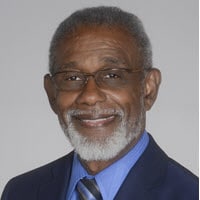The number one issue I have dealt with in my over 40 years of practicing medicine is racism.
As a Black man who grew up in this country, I can tell you first-hand what it does to you. The scars never go away and your status is always in question, no matter your title or uniforms of respect. Eventually it wears you down.
I was born into poverty and the segregation of southwest Louisiana. I experienced the dehumanization intended for me: separate drinking fountains and poor foundational education. I was lucky to attend an HBCU (Southern University in Baton Rouge), that gave me my bearings. I then went to some of the very best, predominantly White institutions.
When I looked for a job after training, there were few integrated medical groups, so I started my own. It included practitioners who were White, Black, Jewish, Asian, Middle Eastern, Muslim, Christian, etc. We cross covered and treated patients from every corner of the globe.
In medicine, we treat human beings with disease. The disease should be the only difference that sets us apart. There is absolutely no place for racism.
It is difficult to be called a racist, and I have met only a handful of people in healthcare whom I would label as such. But racism is structural and institutionalized so that it is often hidden.
One way to overcome this is to make every effort possible to get to know people as individuals. Only then can we see that there are few real differences between us. I would often seek out a colleague from a different culture or race to have lunch with so I could learn more about them.
We all strive for the same things — validation, happiness, love, family, and a future. We all grieve over the same things.
What some caregivers may not realize is that just as clinicians have been trained to recognize subtle signs and symptoms of disease, minorities can recognize racism immediately during a medical encounter. Our past experiences make us skilled at picking up a lack of eye contact or body language and tone of voice that are dismissive and disrespectful.
A patient who has felt racism may still return for care because of insurance coverage limitations, location, or a lack of alternatives. But trust and loyalty will never develop on the part of this patient, and empathy will be absent on the part of their caregiver.
To counter this in my own practice, I developed the Francis Commitment to avoid any hint of racism or bias toward my patients.
I commit to the following:
I see you
I hear you
I accept who you are
I will try to understand how you must feel (empathy)
Treating you is very important to me
I would like to gain your trust that I will do my very best to make you better
I value you as a human being and will treat you as if you are family
I care about what happens to you
I want us to work together to fight this disease
I am grateful that you chose me as your caregiver
The INOVA healthcare system where I work has undertaken an initiative called What Matters Most to better understand the needs of every patient. We are currently working on a strategy of patient personalization to not only learn about their medical needs but also to discover who they are as a person. We incorporate Social Determinants of Health in our dealings with patients. We also have participated in a program called A Long Talk, where we learned that those of us who remain silent when we see or hear racism are responsible for its persistence and growth.
But we must do more. Racism will propagate if we live in silos surrounded by people whose ideas reflect our own. As long as we have nondiversified board rooms, departments, and staff, the problem will persist.
A lot of the biases that we unconsciously carry in our heads and hearts have no basis in reality and were placed there without our permission by parents, society, and friends. But we can replace these divisive thoughts and impulses.
What's in your heart can only be known and controlled by you. How tolerant we are of racism is up to us: Do you call out racism; do you challenge any inkling of racism from friends or acquaintances; do you put pressure on institutions where you work to diversify in recruiting and hiring?
Think of all the advances in medicine that were achieved by people from different cultures and races. Racism has no place in what we have all devoted our lives to do — take care of our fellow humans.
Follow theheart.org | Medscape Cardiology on Twitter
Follow Medscape on Facebook, Twitter, Instagram, and YouTube
Join Medscape's new blog initiative! We're looking for physicians, nurses, PAs, specialists, and other healthcare professionals who are willing to share their expertise in one to two paid blog posts per month. Please email Medscape-Blogs@webmd.net for more information.
Dr Francis is also a songwriter and performer. He is a former recording artist on the Capitol Nashville Country Music Label (1992-1995), and his music has been featured at the National Museum of African American History and Culture in Washington, DC.
Connect with him:
Website: clevefrancis.com
Twitter: @muzicdoc2
Facebook: Cleve Francis
Instagram: @muzidoc
© 2022 WebMD, LLC
Any views expressed above are the author's own and do not necessarily reflect the views of WebMD or Medscape.
Cite this: Cleveland Francis. 10 Steps for Clinicians to Avoid Being Racist: The Francis Commitment - Medscape - Jul 15, 2022.












Comments